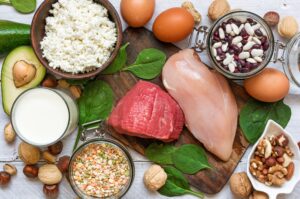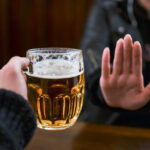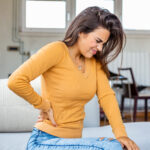November 27, 2023
Certain foods and eating behaviors can sometimes leave you feeling cold after you eat. However, experiencing chills and feeling cold every time you eat could also indicate you have an underlying health condition that requires medical attention.
You may have wondered, “Why am I cold after I eat?” Here are five reasons why you may feel cold after eating and when you should see a doctor.
Why do I get cold after eating? 5 possible reasons
Eating patterns, spicy foods, and certain health conditions may all cause you to feel cold or chilly after you eat. Here’s more about how and why these factors may contribute to chilliness.
1. You eat a low-calorie diet
On average, women should eat between 1,500 and 2,000 calories a day, and men should eat between 2,000 and 2,500 calories a day. If you eat fewer calories than this on a regular basis, your body temperature will drop to help you save energy.
Though eating a low-calorie diet is a possible reason you may feel cold after meals, this behavior will usually make you feel cold ALL the time, and not just after you eat.
2. You practice intermittent fasting
Intermittent fasting is an eating behavior in which you limit yourself to eating only during a certain time window and fast outside that window. An example of intermittent fasting is eating only between 9 a.m. and 5 p.m. and drinking water the rest of the time.
At times when you practice intermittent fasting, your blood sugar can drop low enough to cause hypoglycemia. Shivering and cold sweats are common symptoms of hypoglycemia that could make you feel cold after eating.
3. You eat spicy chili peppers
 Chili peppers contain a compound called capsaicin that produces the burning sensation you typically experience when eating these spicy veggies. When you eat hot peppers, your brain signals to your body that you’re overheated, which is why you may start to sweat. Sweating is your body’s way of cooling itself down and can make you feel chilly after eating.
Chili peppers contain a compound called capsaicin that produces the burning sensation you typically experience when eating these spicy veggies. When you eat hot peppers, your brain signals to your body that you’re overheated, which is why you may start to sweat. Sweating is your body’s way of cooling itself down and can make you feel chilly after eating.
4. You consume cold foods and drinks
Ice cream, milkshakes, and iced tea are some of the many cold foods and beverages that can make you feel chilly after consuming them. If your body temperature feels normal again after about 10 to 30 minutes of eating cold foods, then this reason just may be the culprit.
5. You have an underlying medical condition
Certain health conditions can affect the way your body regulates temperature, metabolism, digestion, and oxygen flow, among many other functions. If you always feel cold after eating, you may have a condition that is interfering with one or more of these bodily processes.
The following conditions may cause chills, shivering, and a cold sensation, even after eating:
- Anemia
- Hypothyroidism
- Diabetes
- Idiopathic postprandial syndrome
How to avoid feeling cold after eating
It’s understandable how feeling cold every time after eating can be unpleasant, uncomfortable, or simply bothersome. Here are steps you can take to stop feeling cold after eating.
Eat a higher amount of calories

Try eating large portions at mealtimes. Or, eat healthy snacks during the day to boost your calorie intake. If you’re cutting back on calories to lose excess weight, aim for 1,500 calories a day (for women) or 2,000 calories a day (for men) to lose one pound a week.
Change your intermittent fasting schedule
Widen the window during which you can eat. Or, take a break for a few days or weeks to boost your blood sugar level.
Avoid hot peppers or buy less spicy peppers
Chili peppers and capsaicin offer numerous health benefits, so you may not want to cut them out of your diet completely. However, you could hunt for peppers that are less spicy at the grocery store.
For example, the spiciest jalapenos feature white “stretch marks” on their skin, which means they experienced stress during the growing process that affected their spice level. Skip over these jalapenos when shopping and choose milder peppers that have smoother, green skin.
Avoid cold or frozen foods
Skip the ice when preparing cold beverages or stick to warm or hot food and drinks. For instance, you could swap out ice cream for warm custard or a milkshake for hot chocolate.
Bundle up after meals

Keep a sweater or blanket on hand to warm yourself up after meals. This will allow you to enjoy ice cream or continue with intermittent fasting if you know these factors are causing you to feel cold.
When to see a doctor
It’s normal to feel cold after eating certain foods. However, it is not normal to experience severe body chills, shivering, or extreme changes in body temperature.
Make an appointment with your doctor as soon as possible if you are experiencing severe symptoms such as these after eating. Your doctor can review your medical history and run the necessary diagnostic tests to see if you have an underlying condition that is causing you to feel cold after eating.
Request an appointment with Healthcare Associates of Texas today to receive treatment for any medical condition, including an underlying condition you think is causing you to feel cold after eating. We offer a variety of primary care services, including wellness exams, screenings, and more.
References
- Osilla, Eva V. 2022. “Calories.” StatPearls – NCBI Bookshelf. September 12, 2022. https://www.ncbi.nlm.nih.gov/books/NBK499909/.
- Institute for Quality and Efficiency in Health Care (IQWiG). 2020. “Hyperglycemia and Hypoglycemia in Type 2 Diabetes.” InformedHealth.Org – NCBI Bookshelf. October 22, 2020. https://www.ncbi.nlm.nih.gov/books/NBK279510/.
- Newman, Bruce, and C Martin. 2001. “The Effect of Hot Beverages, Cold Beverages, and Chewing Gum on Oral Temperature.” Transfusion 41 (10): 1241–43. https://doi.org/10.1046/j.1537-2995.2001.41101241.x.
DISCLAIMER
The information featured in this site is general in nature. The site provides health information designed to complement your personal health management. It does not provide medical advice or health services and is not meant to replace professional advice or imply coverage of specific clinical services or products. The inclusion of links to other web sites does not imply any endorsement of the material on such websites.



